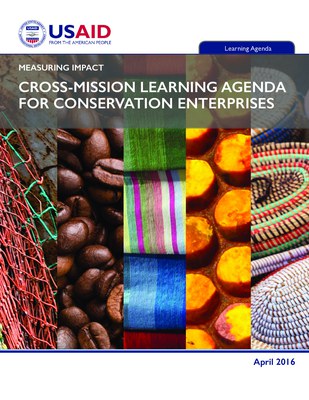Cross-Mission Learning Agenda for Conservation Enterprises

Author(s): USAID
Publication Date: 2016
Location: Africa: Uganda, Malawi, Mozambique, Tanzania. Latin America and Caribbean: El Salvador. Asia: Cambodia, Indonesia, Philippines.
DOWNLOAD FILEThis Learning Agenda explores the conditions under which a specific strategic approach is successful in achieving desired outcomes, and why, in order to improve USAID’s biodiversity programming.
Information relevant to Learning Questions:
Are enabling conditions in place to support a sustainable enterprise?
• Diversification
• Market demand, profit potential, access to credit/capital
• Ownership, governance
• Government requirements, policies for enterprises, business alliances
• Financial management capacity, technical capacity
• Benefit sharing, biodiversity linkage, policies for and enforcement of resource use
Does the enterprise lead to benefits to stakeholders?
• Increased income for participants
• Non-cash benefits
Do the benefits lead to positive changes in attitudes and behavior?
• Attitudes regarding sustainable use of resources
• Behaviors regarding sustainable use of resources
Does a change in stakeholders’ behaviors lead to a reduction to threats to biodiversity (or restoration)?
• Residential and commercial development
• Biological resource use
Does a reduction in threats (or restoration) lead to conservation?
• Forest ecosystems
• Species
Enterprise type:
• Crops
• Livestock
• Sustainably-harvested timber products
• Non-timber forest products
• Sustainably harvested fish and shellfish
• Aquaculture and mariculture
• Marine/freshwater ecotourism
• Terrestrial ecotourism
• Other natural products
Document type:
- Assessment
- Report

